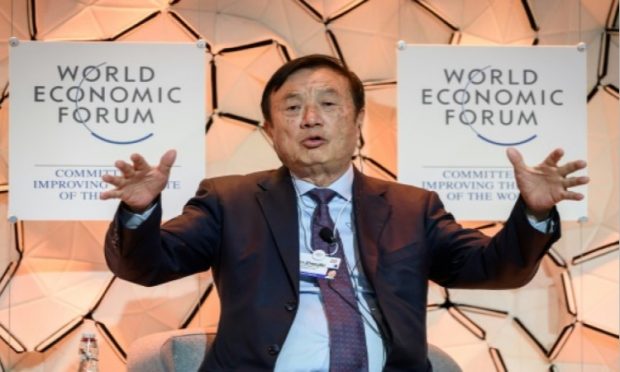
In Davos, the spectre of a tech cold war
PTI, Jan 24, 2020, 4:39 PM IST

Davos: China and the United States may have laid down their arms for now in a trade truce, but their technological rivalry is very much still raging, raising the spectre of a high tech cold war.
The coming battle played out this week in the corridors of the World Economic Forum in Davos, where Chinese executives brushed shoulders with Silicon Valley supremos and US diplomats lobbied hard to keep companies from embracing Made in China for their tech revolution.
At the centre of this cold war 2.0 is Huawei, the Chinese telecom giant rolling out of 5G technology that is key to delivering artificial intelligence and the next generation computing globally.
Despite the idyllic winter setting, the tensions over Huawei between Beijing and Washington couldn’t be higher.
Huawei has been banned from the United States, which insists on the risk of Chinese espionage and implores its European allies to do the same as the company rolls out deals in major emerging markets led by Brazil and India.
Making matters personal, company founder Ren Zhengfei, a Davos star this year, came to the snowy resort just as his daughter, the company’s chief financial officer, was being grilled in Canada for extradition to the US where she is wanted for fraud and breaking US sanctions against Iran.
“A world divided? I don’t believe it,” he told to an audience of CEOs and top executives avoiding all controversy.
But experts assessing this new digital battleground warn of a world entering a digital schism.
“There is a competition for predominance globally on digital questions. Huawei is a symbol of that but it runs much deeper,” Carlos Pascual, a former American diplomat and vice-president of IHS Markit told AFP.
For Pascual, cyber-conflicts and “battles of influence” are paving the way for “a major Sino-American confrontation.”
The confrontation ratcheted up in 2015 when Beijing adopted the ambitious “Made in China 2025” programme to boost its technologies, along with a massive infrastructure investment plan for the “Silk Roads” to Asia, Europe and Africa.
“This could lead many developing countries to look to China to build their telecom networks, relay stations, data centres and government IT systems,” said John Chipman, an expert leading the International Institute for Strategic Studies (IISS).
According to Chipman, this expansion of Chinese firms across all continents is also expanding the collection of troves of data, the magic ingredient to develop artificial intelligence that will be the foundation for tomorrow’s economy.
It is this vacuuming up of data that irks Washington, which has also blacklisted several Chinese cyber-surveillance and facial recognition firms.
Meanwhile, Chinese internet giants Baidu, Alibaba and Tencent, pushed by Beijing, are developing artificial intelligence platforms, autonomous cars or connected objects distinct from those developed in Silicon Valley by Google or Amazon.
“The concern is that there will be two types of systems that are not compatible. Technology is an issue of power and a bipolarisation is taking place,” said Jacques Moulin, head of the European think tank Idate.
Jean-Philippe Courtois, executive vice-president of Microsoft, confirmed this emerging split world.
“The risk is that the tectonic plates” of the major technological markets “will become more and more fragmented or more and more distant,” Courtois, who leads global sales for the US-based giant, told AFP.
“Our role is to take charge of this complexity by offering companies tools adapted to each regulatory environment,” said Courtois whose company, along with Apple, is still largely dependent on China.
This, despite the fact that China strictly regulates its domestic Internet – enforcing the concept of a “splinternet”, with growing restrictions on both sides of the Pacific putting paid the idea of an “economic iron curtain” that former US Secretary of State Henry Paulson feared in November 2018.
Can China meet its ambitions? In 2018, the telecom equipment manufacturer ZTE, another Chinese 5G giant, nearly disappeared, unable to import American components after a ban by the Trump administration that was finally lifted.
The episode was traumatic for Beijing and highlighted the Asian giant’s cruel dependence on American chips: in total, China imports more semiconductors than oil in terms of value.
Admittedly, under pressure, Huawei is developing its own chips and its recent Mate 30 Pro model no longer contains US components, according to a Japanese firm that has taken apart the device.
Qualcomm, the US microchip giant, has been plagued by the sanctions against Huawei but said the situation wasn’t lost.
“During the peak of the trade tensions our collaboration with China actually increased” with companies like Xiaomi and Oppo and Vivo,” the company’s president Cristiano Amon told AFP.
For these companies to “grow outside China, you need to work with international global standards and you need to partner with companies like Qualcomm.
Udayavani is now on Telegram. Click here to join our channel and stay updated with the latest news.
Top News
Related Articles More

Patanjali Foods to evaluate proposal to buy Patanjali Ayurved’s non-food business

Nifty, Sensex rally for 6th day running on firm Asian peers; Tech Mahindra jumps over 12%

IndiGo, Air India plan to purchase up to 170 wide-body planes in little over a year

Kotak Mahindra Bank shares tank 13%; mcap erodes by Rs 37,721 crore post RBI action

Four-day market rally makes investors richer by Rs 8.48 lakh crore
MUST WATCH
Latest Additions

Patanjali Foods to evaluate proposal to buy Patanjali Ayurved’s non-food business

Congress to discuss candidates for Amethi, Raebareli seats on Saturday

BJP’s CT Ravi Booked for Promoting Hatred and Enmity Through Social Media Post

Elections held in 14 LS segments in Karnataka, voter turnout nearly 64 per cent till 5 pm

‘PM is scared, may even shed tears on stage’: Rahul Gandhi’s fresh salvo at Modi

























